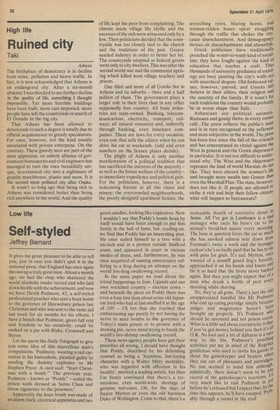High life
Ruined city
Taki
Athens The birthplace of democracy is in decline from noise, pollution and heavy traffic. In fact, it is now acknowledged that Athens is an endangered city. After a six-month absence I was shocked to see further decline in the quality of life, something I thought impossible. Yet more horrible buildings have been built, more cars imported, more people have left the countryside in search of El Dorado in the big city.
That Athens has been allowed to deteriorate to such a degree is totally due to official acquiescence to greedy speculators. For once, however, not the kind usually associated with private enterprise. On the contrary. These greedy men are part of the state apparatus: an unholy alliance of government bureaucrats and civil engineers has managed to turn the once beautifully unique, neo-classical city into a nightmare of granite matchboxes, plastic and neon. It is the second most polluted city after Osaka.
It wasn't so long ago that being rich in Athens was considered better than being rich anywhere in the world. And the quality of life kept the poor from complaining. The climate made village life idyllic and the excesses of the rich were witnessed only by a few. Then politicians decided that the countryside was too closely tied to the church and the traditions of the past. Greece needed industry in order to better her lot. The countryside emptied as federal grants went only to city dwellers. This was after the second world war and the communist uprising which killed most village teachers and priests.
One third and more of all Greeks live in Athens and its suburbs — three and a half million of them. The government plays a larger role in their lives than in any other supposedly free country. All basic industries are state-owned. Banking, telecommunications, electricity, transport, railways, all natural resources and, indirectly through banking, even insurance companies. There are laws for every occasion, even one that tells the citizen when he can drive his car at weekends. (odd and even numbers on the licence plates decide).
The plight of Athens is only another manifestation of a political tradition that has sacrificed the interests of the majority — as well as the future welfare of the country — to immediate expedience and political gain. For the politicians, however, there is a redeeming feature in all this chaos and misery: the overcrowded neighbourhoods, the poorly-designed apartment houses, the screeching tyres, blaring horns, and tension-ridden hours spent struggling through the traffic that chokes the city, cause disenchantment. And demagoguery thrives on disenchantment and alienation.
Greek politicians have traditionally preached the womb-to-tomb kind of socialism; they have fought against the kind of education that teaches a craft. Thus thousands of university graduates of sociology are busy painting the city's walls red with anarchical slogans. Old-fashioned values, however, prevail, and Greeks still believe in their elders, their religion and the sanctity of the family. If it wasn't for such traditions the country would probablY 'be in worse shape than Italy. Athenians are political animals. Rumours and gossip thrive in every cornet café. The press reflects the public's taste and is in turn recognised as the yellowest and most subjective in the world. The press has been free since the fall of the colonels and has concentrated its vitriol against the West in general and the Greek shipowners in particular. It is not too difficult to understand why. The West and the shipowners represent the kind of world Marxists do not like. They have altered the seamen's life and brought more wealth into Greece than even the Marshall Plan. The state, however, does not like it. If people are allowed to strike it rich and help their fellow citizens what will happen to bureaucrats?






































 Previous page
Previous page